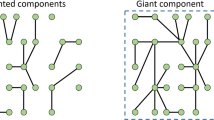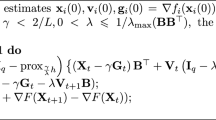Abstract
In this paper, consensus problems in discrete-time multiagent systems with time-invariant delays are considered. In order to characterize the structures of communication topologies, the concept of “pre-leader-follower” decomposition is introduced. Then, a necessary and sufficient condition for state consensus is established. By this method, consensus problems in networks with a single time-delay, as well as with multiple time-delays, are studied, and some necessary and sufficient conditions for solvability of consensus problems are obtained.
Similar content being viewed by others
References
Wang L, Shi H, Chu T, et al. Aggregation of foraging swarms. In: Lecture Notes in Artificial Intelligence, Vol. 3339. Berlin: Springer-Verlag, 2004, 766–777
Chu T, Wang L, Chen T, et al. Complex emergent dynamics of anisotropic swarms: convergence vs oscillation. Chaos Solitons & Fractals, 2006, 30(4): 875–885
Mu S, Chu T, Wang L. Coordinated collective motion in a motile particle group with a leader. Physica A, 2005, 351(2–4): 211–226
Shi H, Wang L, Chu T. Virtual leader approach to coordinated control of multiple mobile agents with asymmetric interactions. Physica D, 2006, 213(1): 51–65
Liu B, Chu T, Wang L, et al. Swarm dynamics of a group of mobile autonomous agents. Chin Phys Lett, 2005, 22(1): 254–257
Vicsek T, Czirok A, Ben-Jacob E, et al. Novel type of phase transition in a system of self-driven particles. Phys Rev Lett, 1995, 75(6): 1226–1229
Reynolds C W. Flocks, herds, and schools: a distributed behavioral model. Comp Graph, 1987, 21: 25–34
Jadbabaie A, Lin J, Morse A S. Coordination of groups of mobile autonomous agents using nearest neighbor rules. IEEE T Automat Contr, 2003, 48(9): 988–1001
Olfati-Saber R, Murray R M. Consensus problems in networks of agents with switching topology and time-delays. IEEE T Automat Contr, 2004, 49(9): 1520–1533
Ren W, Beard R W. Consensus seeking in multiagent systems under dynamically changing interaction topologies. IEEE T Automat Contr, 2005, 50(5): 655–661
Hatano Y, Mesbahi M. Agreement over random networks. IEEE T Automat Contr, 2005, 50(11): 1867–1872
Savkin A V. The problem of coordination and consensus achievement in groups of autonomous mobile robots with limited communication. Nonlinear Anal-Theor, 2006, 65(5): 1094–1102
Fang L, Antsaklis P J. Information consensus of asynchronous discrete-time multi-agent systems. In: Proc. Amer Contr Conf, 2005, 1883–1888
Spanos D P, Olfati-Saber R, Murray R M. Dynamic consensus on mobile networks. In: The 16th IFAC World Congress, 2005
Moreau L. Stability of multiagent systems with time-dependent communication links. IEEE T Automat Contr, 2005, 50(2): 169–182
Xiao F, Wang L. Dynamic behavior of discrete-time multiagent systems with general communication structures. Physica A, 2006, 370(2): 364–380
Olfati-Saber R, Shamma J S. Consensus filters for sensor networks and distributed sensor fusion. In: Proc IEEE Conf Decision and Control, 2005, 6698–6703
Tanner H G, Christodoulakis D K. State synchronization in local-interaction networks is robust with respect to time delays. In: Proc IEEE Conf Decision and Control, 2005, 4945–4950
Xiao F, Wang L. State consensus for multi-agent systems with switching topologies and time-varying delays. Intern J Control, 2006, 79(10): 1277–1284
Lee D, Spong M W. Agreement with non-uniform information delays. In: Proc Amer Contr Conf, 2006, 756–760
Ren W, Beard R W, Atkins E M. A survey of consensus problems in multi-agent coordination. In: Proc Amer Contr Conf, 2005, 1859–1864
Horn R A, Johnson C R. Matrix Analysis. New York: Cambridge University Press, 1985
Godsil C, Royal G. Algebraic Graph Theory. New York: Springer-Verlag, 2001
Jadbabaie A. On geographic routing without location information. In: Proc IEEE Conf Decision and Control. 2004, 4764–4769
Xiao F, Wang L, Wang A. Consensus problems in discrete-time multiagent systems with fixed topology. J Math Anal Appl, 2006, 322(2): 587–598
Author information
Authors and Affiliations
Corresponding author
Additional information
Supported by the National Natural Science Foundation of China (Grant Nos. 60674050 and 60528007), the National 973 Program (Grant No. 2002CB312200), the National 863 Program (Grant No. 2006AA04Z258) and 11-5 project (Grant No. A2120061303)
Rights and permissions
About this article
Cite this article
Wang, L., Xiao, F. A new approach to consensus problems in discrete-time multiagent systems with time-delays. SCI CHINA SER F 50, 625–635 (2007). https://doi.org/10.1007/s11432-007-0044-3
Received:
Accepted:
Issue Date:
DOI: https://doi.org/10.1007/s11432-007-0044-3




